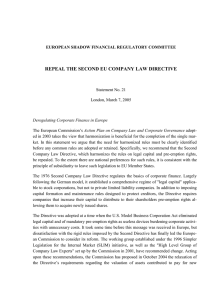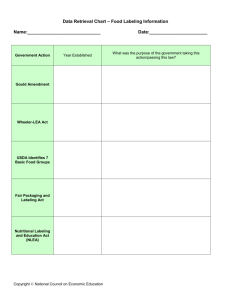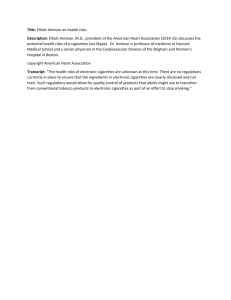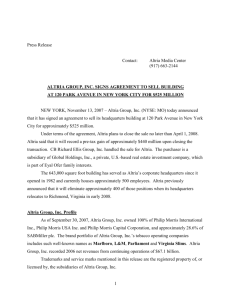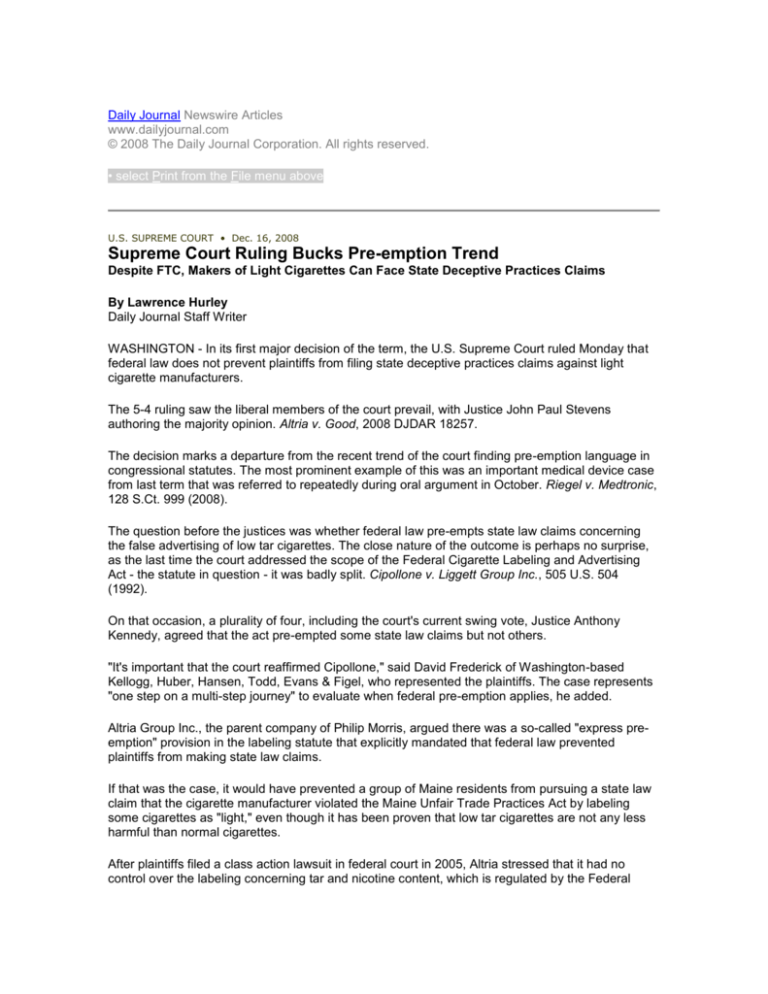
Daily Journal Newswire Articles
www.dailyjournal.com
© 2008 The Daily Journal Corporation. All rights reserved.
• select Print from the File menu above
U.S. SUPREME COURT • Dec. 16, 2008
Supreme Court Ruling Bucks Pre-emption Trend
Despite FTC, Makers of Light Cigarettes Can Face State Deceptive Practices Claims
By Lawrence Hurley
Daily Journal Staff Writer
WASHINGTON - In its first major decision of the term, the U.S. Supreme Court ruled Monday that
federal law does not prevent plaintiffs from filing state deceptive practices claims against light
cigarette manufacturers.
The 5-4 ruling saw the liberal members of the court prevail, with Justice John Paul Stevens
authoring the majority opinion. Altria v. Good, 2008 DJDAR 18257.
The decision marks a departure from the recent trend of the court finding pre-emption language in
congressional statutes. The most prominent example of this was an important medical device case
from last term that was referred to repeatedly during oral argument in October. Riegel v. Medtronic,
128 S.Ct. 999 (2008).
The question before the justices was whether federal law pre-empts state law claims concerning
the false advertising of low tar cigarettes. The close nature of the outcome is perhaps no surprise,
as the last time the court addressed the scope of the Federal Cigarette Labeling and Advertising
Act - the statute in question - it was badly split. Cipollone v. Liggett Group Inc., 505 U.S. 504
(1992).
On that occasion, a plurality of four, including the court's current swing vote, Justice Anthony
Kennedy, agreed that the act pre-empted some state law claims but not others.
"It's important that the court reaffirmed Cipollone," said David Frederick of Washington-based
Kellogg, Huber, Hansen, Todd, Evans & Figel, who represented the plaintiffs. The case represents
"one step on a multi-step journey" to evaluate when federal pre-emption applies, he added.
Altria Group Inc., the parent company of Philip Morris, argued there was a so-called "express preemption" provision in the labeling statute that explicitly mandated that federal law prevented
plaintiffs from making state law claims.
If that was the case, it would have prevented a group of Maine residents from pursuing a state law
claim that the cigarette manufacturer violated the Maine Unfair Trade Practices Act by labeling
some cigarettes as "light," even though it has been proven that low tar cigarettes are not any less
harmful than normal cigarettes.
After plaintiffs filed a class action lawsuit in federal court in 2005, Altria stressed that it had no
control over the labeling concerning tar and nicotine content, which is regulated by the Federal
Trade Commission.
The lower court in Maine bought the argument and granted Altria's motion for summary judgment in
2006. But, the 1st U.S. Circuit Court of Appeals reversed a year later.
In affirming the appeals court, Stevens was joined by Justices David H. Souter, Ruth Bader
Ginsburg, Stephen Breyer, and, crucially, Kennedy.
The justices remanded the case back to the district court in Maine, where the merits of the plaintiffs'
claim will be addressed.
Stevens conceded that there are express pre-emption provisions in the labeling act but concluded
that they do not apply to deceptive practices claims.
The law simply regulates what health warning language should be included on packaging and
prevents states from adapting it, he wrote.
"Although both of the act's purposes are furthered by prohibiting states from supplementing the
federal prescribed warning, neither would be served by limiting the states' authority to prohibit
deceptive statements in cigarette advertising," Stevens added.
Justice Clarence Thomas wrote a dissenting opinion in which he was joined by Chief Justice John
G. Roberts Jr., Antonin Scalia, and Samuel A. Alito Jr.
Thomas criticized the majority for relying on the plurality decision in Cipollone.
"The court's fidelity to Cipollone is unwise and unnecessary," he wrote.
Lower courts need a "clear test" in order to correctly interpret Congress' intent to expressly preempt state claims, Thomas added.
In his view, based on Scalia's dissent in Cipollone, a close reading of the labeling statute leads to
only one conclusion: any lawsuit alleging injury relating to use of cigarettes is pre-empted.
Altria also had a secondary "implied pre-emption" argument, in which the company claimed that
even if express pre-emption was not in the statute, there was enough evidence to suggest that
Congress implied that state law was pre-empted.
But even Roberts and Scalia hinted strongly at the oral argument that such an argument was a
waste of time.
Altria's lawyer, Gibson Dunn & Crutcher's Theodore B. Olson, barely addressed it and Thomas did
not reach the issue in his dissent.
David Vladeck, a professor at Georgetown Law Center who filed a brief in support of the plaintiffs,
said he was not surprised at the outcome.
Olson was relying on Kennedy reversing his vote against pre-emption in Cipollone, he said.
The decision shows that "the battle lines are pretty clearly drawn" when it comes to pre-emption,
Vladeck added.
It's unclear whether the decision has any bearing on the other major pre-emption case on the
docket, which focuses on whether federal law prevents plaintiffs from filing state lawsuits on drug
liability claims. Wyeth v. Levine, 06-1249.
That case is distinct from Good because it focuses solely on implied pre-emption arguments and
involves a different statute.
In a statement on Monday's decision, Philip Morris declared that it would continue to fight the
dozens of state lawsuits it faces over its light cigarettes.
"We continue to view these cases as manageable, and the company will assert many of the strong
defenses used successfully in the past to defend against this very type of case," said Murray
Garnick, the firm's senior vice president and associate general counsel.
lawrence_hurley@dailyjournal.com
This article appears on Page 1
**********
© 2008 Daily Journal Corporation. All rights reserved.

